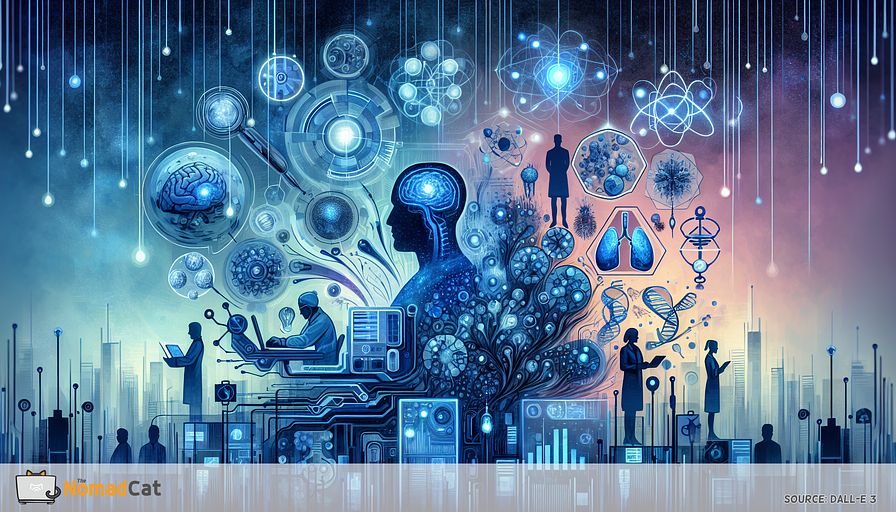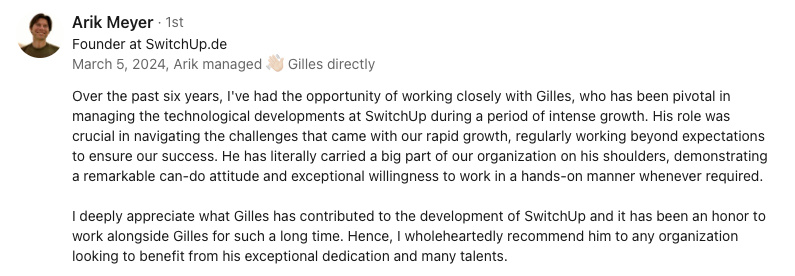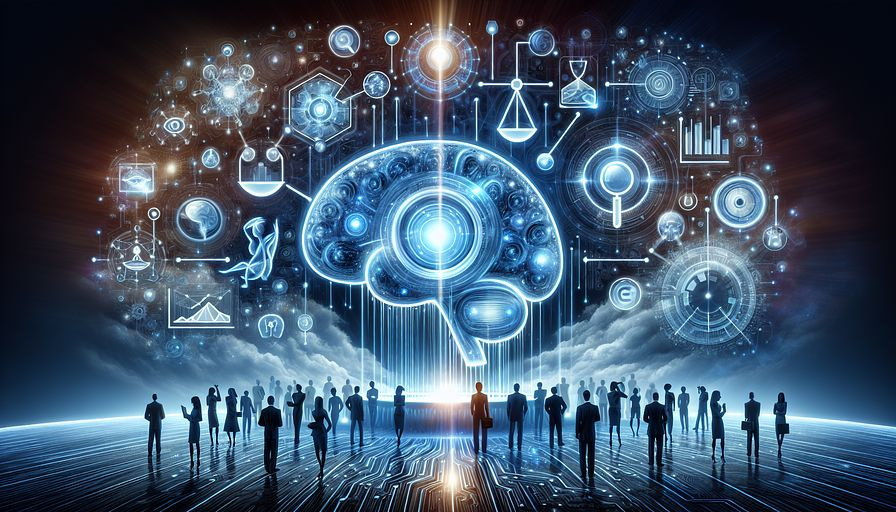Abstract:
AI and machine learning are driving revolutionary changes in personalized medicine by enabling efficient processing and analysis of genomic data, leading to more accurate diagnoses and effective treatments. Technology leaders such as CTOs, Directors of Technologies, and Directors of Engineering play critical roles in understanding and implementing these technologies in healthcare. The future of AI and ML in personalized medicine is promising, with expectations of more powerful integration into clinical practice, contributing to the development of new therapeutic strategies and reducing healthcare costs.
the impact of AI on personalized medicine
You know, it's quite exciting to witness how artificial intelligence (AI) and machine learning (ML) are shaking up the healthcare sector, especially in personalized medicine. AI's capacity to process and analyze gigantic streams of genomic data has opened doors we never imagined possible.
Imagine harnessing the power of AI to sift through terabytes of genetic information, identifying patterns and anomalies that humans might miss. This technological muscle allows us to deliver more accurate diagnoses and devise highly effective treatments tailored to individual patients.
The sky's the limit when you think about the potential benefits. From reducing the trial-and-error approach in treatments to predicting patient responses to specific drugs, the fusion of AI with genomic data is nothing short of revolutionary. And let's not forget the potential in early detection of diseases, improving outcomes, and reducing overall healthcare costs.
In essence, AI is turning what once seemed like science fiction into tangible, real-world solutions. So, as we journey through the following sections, prepare to explore how technology leaders, including CTOs like myself, are driving this change, and what it means for the future of healthcare.
role of AI in processing genomic data
Have you ever tried finding a needle in a haystack? Now imagine that haystack is made up of billions of strands of genetic data, and you need to find multiple needles, each one critical to a patient's health. That's where AI comes in, and believe me, it's no simple task. Using AI and machine learning to handle these vast amounts of genomic data has been a game-changer.
AI algorithms act like expert data miners, sifting through terabytes of genetic information at lightning speed. They identify patterns and correlations that might be elusive to the human eye. The precision with which AI can handle genetic data is remarkable, allowing healthcare providers to achieve more accurate and personalized medical interventions. It's like having a personal assistant for your DNA, and who wouldn't want that?
Here's how it works:
- Data Processing Speed: AI can process large volumes of genetic data exponentially faster than any human, turning a massive data analysis job from weeks or months into mere hours or days.
- Pattern Recognition: AI excels at recognizing patterns and anomalies that are crucial for identifying genetic markers and mutations. This can inform more precise diagnostics and treatment plans.
- Predictive Insights: Machine learning models can predict how a patient might respond to a certain medication based on their genetic profile, reducing the trial-and-error approach in treatments.
- Cost-effectiveness: By improving accuracy in diagnosis and treatment, AI helps in reducing unnecessary tests and procedures, thus cutting down healthcare costs.
From my perspective as a CTO, watching these algorithms work their magic is nothing short of awe-inspiring. It’s like seeing the future unfold in real-time, and it gets me excited about the infinite possibilities we have at our fingertips. So, as we continue this journey, let's keep our minds open to how AI is shaping the landscape of personalized medicine, one genetic sequence at a time.
CTOs and technology leaders in implementing AI
As a CTO, you can imagine how often I find myself at the intersection of cutting-edge technology and practical application. Implementing AI and machine learning in healthcare requires a unique balance of visionary thinking and grounded execution. We're not just daydreaming about sci-fi futures; we're turning those dreams into real-world drama.
One of our primary responsibilities is to comprehend both the capabilities and the limitations of AI. This nuanced understanding allows us to make informed strategic decisions. We need to discern which AI technologies align best with our goals in personalized medicine and how they fit into our existing infrastructure.
Key responsibilities of CTOs in healthcare AI
Let's break this down a bit further:
- Identifying Needs: One of our first tasks is to pinpoint where AI can add the most value. This involves deep dives into clinical workflows and understanding the pain points that AI could alleviate.
- Choosing the Right Tools: With a multitude of AI platforms available, selecting the right one is crucial. We're looking for solutions that are robust, scalable, and secure.
- Integration: Implementing AI isn't just about plugging in a new system. It requires seamless integration with existing healthcare technologies like EHRs and lab systems, ensuring data flow is uninterrupted.
- Compliance and Ethics: Healthcare is a tightly regulated field. Ensuring that our AI deployments comply with all relevant laws and ethical standards is non-negotiable. This ensures patient data privacy and system reliability.
- Team Leadership: Finally, leading a team of tech experts and often training healthcare professionals to work with new AI tools is another hat we wear. Change management is just as critical as the tech itself.
Now, sprinkle in some of the challenges, and you've got quite the juggling act. Implementing AI in healthcare isn't always smooth sailing. There's resistance to change and skepticism to overcome. But hey, if it were easy, everyone would do it, right? The key is persistence and the confidence that the benefits we'll achieve make every hurdle worthwhile.
As we move forward, it's exciting to think about what lies on the horizon. AI is evolving, and so is our approach to healthcare. Combining advanced technology with the human touch is the formula for transformative outcomes. And that, my friends, is something worth striving for.
case studies: successful integration of AI in medicine
Let's shift our gears from theoretical musings to practical applications. Nothing illustrates the magic of AI in personalized medicine better than real-world examples. Here are some case studies showcasing how AI has made waves in healthcare, leading to significant advances in diagnosis, treatment plans, and overall patient care.
Mayo Clinic: Improving Breast Cancer Detection
The Mayo Clinic has long been a pioneer in healthcare innovation. They've recently employed AI to enhance breast cancer detection. Traditional mammograms, while effective, are not infallible. False negatives can happen, and early-stage cancers might be missed. By integrating AI algorithms into their imaging systems, they achieved a substantial improvement in detection rates. These advanced systems can analyze mammograms with remarkable accuracy, identifying tumors that might slip past human eyes. The result? Earlier diagnosis and improved treatment outcomes for countless women.
IBM Watson: Tailoring Cancer Treatments
Next up is IBM Watson, a name that needs no introduction in the AI world. Watson has been put to work in oncology departments to assist in crafting personalized treatment plans for cancer patients. With its ability to process extensive medical literature and patient data, Watson provides oncologists with evidence-based treatment recommendations. It considers genetic mutations, the types of cancer, previous patient outcomes, and even emerging therapies. Think of it as having a super-genius oncologist on the team who never takes a break. Patients receive highly tailored treatments, enhancing the chances of successful outcomes.
Stanford University: Early Detection of Skin Cancer
Stanford University’s AI model for skin cancer detection is another shining star. By training their AI system on millions of images of skin lesions, Stanford researchers developed a tool capable of diagnosing skin cancer with accuracy comparable to dermatologists. This tool can be utilized not just in clinics but also for remote diagnostics, democratizing access to early detection. Imagine equipping primary care doctors with a technology that allows them to catch skin cancer before it becomes life-threatening. It's a game-changer.
Human Longevity Inc.: Personalized Wellness Programs
Human Longevity Inc., co-founded by genomics visionary Dr. J. Craig Venter, leverages AI for creating personalized wellness programs. By analyzing an individual's genome, microbiome, and other health data, their AI models generate customized health plans aimed at optimizing wellness and preventing diseases before they occur. Their comprehensive approach means you get a tailor-made blueprint for your health journey, highlighting potential risks and proactive measures. It’s like having a crystal ball for your well-being.
These examples highlight the real-world benefits AI brings to personalized medicine. While challenges remain, the successes are a testament to the transformative potential AI holds. So next time you hear about AI in healthcare, think about these success stories and know we're just scratching the surface of what's possible.
challenges in adopting AI in personalized medicine
Let's address the elephant in the room: adopting AI in personalized medicine is not without its hurdles. While the potential benefits are immense, several challenges need to be tackled to ensure its successful integration into healthcare systems.
ethical concerns
First off, ethical concerns are paramount. AI systems, particularly in healthcare, must ensure they don't act unethically or cause harm. Decisions about life and death should never be made lightly, and AI algorithms need to be transparent and free from biases. The question of accountability also pops up—who's to blame if an AI system makes a wrong diagnosis? These ethical dilemmas require rigorous oversight and continuous monitoring.
data privacy issues
Next, we have data privacy issues. Handling sensitive patient data comes with enormous responsibility. Ensuring that this data is secure from breaches while being used by AI systems for analysis is a balancing act. Health data is lucrative for hackers, and a single breach could have wide-reaching consequences. Encrypting data, using secure storage solutions, and complying with data protection regulations like GDPR are essential steps in safeguarding patient information.
technological limitations
Then, there's the matter of technological limitations. AI, despite its capabilities, is not infallible. Algorithms require extensive training data and computational resources, which can be a limiting factor for smaller healthcare institutions. Moreover, sometimes AI systems are only as good as the data they're trained on. Poor-quality or biased data can lead to flawed outcomes. Ensuring access to high-quality, diverse datasets is crucial for the AI's accuracy and reliability.
steps to overcome challenges
So, how do we overcome these challenges? Well, it starts with collaboration. Healthcare providers, technologists, policymakers, and ethicists must work together. Open dialogue and shared goals can drive better outcomes. Additionally, continuous education and training for healthcare personnel about AI tools can alleviate fears and build trust in these systems.
Investing in robust cybersecurity measures will help protect sensitive data. Regulatory frameworks need to be adaptive and forward-thinking, keeping pace with technological advancements while safeguarding public interest. Transparency in AI algorithms and making their decision-making processes explainable can address ethical concerns and build confidence in their use.
While the road to widespread AI adoption in personalized medicine is fraught with challenges, the journey is undeniably worth it. The potential to transform patient care, save lives, and enhance healthcare efficiency is like a pot of gold at the end of the AI rainbow. And as we continue navigating these challenges, we inch closer to a brighter, healthier future.
future of AI and ML in personalized medicine
Picture this: we're barely scratching the surface of what AI and ML can do in personalized medicine. Looking ahead, I see these technologies becoming seamlessly integrated into clinical practice, almost like an intelligent sidekick for healthcare professionals. When you combine the brains of AI with the human touch, magic happens. Here's what we can expect:
enhanced therapeutic strategies
AI is set to propel the development of new therapeutic strategies. With its analytical might, it can dive into vast datasets, identify potential drug candidates, and predict patient responses, thus fast-tracking the development of personalized treatments. It’s like having Sherlock Holmes on your healthcare team, solving medical mysteries with unparalleled precision.
more precise diagnostics
Expect a significant leap in diagnostic accuracy as AI tools become more sophisticated. Imagine being able to diagnose rare diseases with pinpoint accuracy or even predicting disease outbreaks before they happen. AI's pattern-recognition capabilities are bound to revolutionize how we understand and treat complex conditions.
cost reduction
Let’s not ignore the financial aspect. AI systems can streamline operations, reduce unnecessary tests, and enhance treatment efficacy, leading to substantial cost savings for healthcare providers and patients alike. Essentially, AI is putting the "smart" in smart healthcare, making high-quality care more accessible and affordable.
patient experience enhancement
The future holds promise for an improved patient experience. With AI, personalized health plans can be created, enhancing patient engagement and adherence to treatment plans. Imagine a world where your medical app knows you better than your best friend, guiding you on your health journey with recommendations tailored to your unique needs.
So yes, the road ahead is looking pretty exciting. While challenges and hurdles remain, the potential of AI and ML in transforming personalized medicine is both fascinating and inspiring. Let’s buckle up and embrace the future, one algorithm at a time!
embracing AI for a healthier future
As we've journeyed through the many facets of AI's impact on personalized medicine, I'm genuinely excited about the possibilities. From processing genomic data with pinpoint accuracy to implementing sophisticated AI strategies, we've seen how these technologies can revolutionize healthcare.
Key takeaways include:
- AI's prowess in handling vast datasets: offering more accurate diagnoses and individualized treatments.
- CTOs and tech leaders: driving successful AI implementation by choosing the right tools and integrating them effectively.
- Real-world case studies: demonstrating AI's tangible benefits in early disease detection and personalized treatment plans.
- Challenges: emphasizing the importance of addressing ethical concerns, data privacy issues, and technological limitations.
- The future outlook: highlighting enhanced therapeutic strategies, cost reductions, precise diagnostics, and improved patient experiences.
The horizon of healthcare looks incredibly promising, thanks to AI and ML. We're on the brink of transforming patient care in ways previously unimaginable. Let's harness these advancements to create a healthier, more efficient, and personalized healthcare system. Here's to a future where technology and humanity work hand in hand for better health outcomes for everyone!
You might be interested by these articles:
- Transforming Healthcare with AI-Driven Diagnostics
- AI transforming healthcare logistics for cost savings and efficiency





